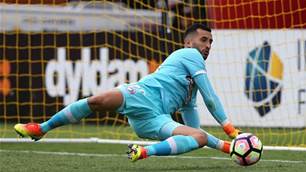YOU could be forgiven for thinking Cassio has only ever played in Australia after seven years playing for Adelaide United, but to most Reds fans, he's now part of the furniture.
Page 1 of 4 | Single page
Cassio is their token "Braussie" - but had you asked him early in his career if he would ever play football in Australia, he would have kindly laughed off the suggestion.
All the kid from Rio ever wanted since he was just four years old was to become a footballer. But then again, he was Brazilian...
"Every kid in Brazil - their dream is to become a footballer," he tells me. "Pretty much all the players start playing futsal or street football. We would use thongs to make the goals, socks or scrunched up paper as the ball, and we would be barefoot. Our feet would always be bleeding."
It's a vision that's easy to imagine - a country full of talented Brazilian kids swarming the streets all hoping to get a shot at the big time one day. To be professionals, to be able to provide for their families - for many kids in Brazil, the pressure to make it is huge.
"Most of the players growing up in Brazil are poor - football is their only option," Cassio says. "The families put the pressure on the boys to be footballers so they can support them financially. Their Mum might not have a job and their Dad could be a drug dealer."
It's a serious occupation in Brazil, football. Going back 20 years when Cassio was 13, he would get paid $200 a month simply to be able to survive while playing for his team.
"Most of the boys were very poor - they didn't have money to take the bus to training or to feed themselves", Cassio explains. "It's treated like a job over there. The 13 year olds play in big stadiums and people come to watch them play.
"It's how I got my opportunity to play for Flamengo."
 For a 13 year old Cassio, it was nothing short of a dream come true - Flamengo was the team he grew up supporting and from the minute he won a place in the junior system he knew it was serious.
For a 13 year old Cassio, it was nothing short of a dream come true - Flamengo was the team he grew up supporting and from the minute he won a place in the junior system he knew it was serious.
"I had to change my life around football", he says, "I went to school in the mornings, but I went just to go, because I was a footballer first."
Cassio had a promising youth career leading up to his first professional appearance for Flamengo where, literally overnight, he became a star.
"It all happened so quickly," wife Juliana recalls. "He just became so busy and he was going to events, promotions, dinners, VIP parties. I thought, 'Gosh, I think I've lost my boyfriend'."
For Cassio, however, growing up as part of the minority - in an environment that wasn't poor - meant he was able to keep, for the most part, level headed. The same cannot be said for most of his teammates, many who had grown up in "Favelas" - the slums of Rio.
 "Some kids were so poor they would steal, rob people on the streets, just to survive," he says. "So when they would 'make it' as a footballer, they didn't know how to handle the wealth, the fame."
"Some kids were so poor they would steal, rob people on the streets, just to survive," he says. "So when they would 'make it' as a footballer, they didn't know how to handle the wealth, the fame."
"Many of them continued in their careers, others didn't, because they had never had structure in their lives, or anyone to support them.
"I was lucky."
Once you hit the big time in Brazil, a certain level of status follows. A win or good performance would mean you could be called into the office to receive a bonus up to seven times your monthly wage and a loss meant you would have to stay indoors until the dust settles.
"I bought a thick gold necklace with my first bonus," Cassio tells me, laughing. "It was a normal thing to do - to show everyone you were part of the big boys."
Juliana, rolling her eyes, agrees, "It's part of society over there. My friends would ask why I didn't have the same expensive handbag as them and would tell me my car is too old. Everything is a competition."
Continued on next page...
Copyright © FourFourTwo Australia . All rights reserved.
Related Articles

Socceroo-in-waiting seals Championship deal

Fringe Socceroo swerves A-League to remain in Europe after Fulham exit













